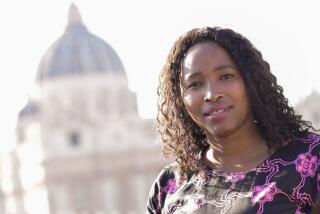Women’s Summit Ends on Charge It Favored Elite
- Share via
DUBLIN, Ireland — Women from 53 countries ended their international summit on a note of conflict Sunday, with some of the 400-plus delegates complaining that elitism--not solidarity--was the net effect.
Although many participants praised the four-day conference organized by Washington, D.C., activist Irene Natividad, the gathering closed with a protest by Irish working-class women who said they had been denied a voice here.
The 10 Irishwomen received a standing ovation after being allowed to take the floor during the conference’s final 20 minutes.
Alluding to panels filled with high-powered executives, lawyers, academics, politicians and activists, Cathleen O’Neill warned: “Women like us must never be overlooked again when global forums are being organized.”
The next one is planned for 1994 in Barcelona, Spain, followed by another the following year in Beijing.
Natividad, though not present for the protesters’ presentation, later brushed off the criticism, pointing out that several grass-roots organizations were represented on the speakers’ list.
“No gathering occurs without some glitches,” Natividad said. “Above the glitches, there was a spirit of energy to propel women forward.”
The conference drafted resolutions about women and politics, labor, religion, health and the media. “This is an endless process,” said author Betty Friedan, a pioneer in the feminist movement. “It may never be completed. It’s an evolution.
“We may make mistakes,” she told the closing session. “We may trash our mothers or each other for two minutes, but we resolve it, we move on.”
Khadija abu Ali, a Palestinian filmmaker, was among those who left the conference with mixed feelings.
“It was nice, but there was something missing,” she said. “There was something lost.”
She said she had paid her own way from Jordan hoping to share her own experiences and insights but found that the forum allowed too little time for audience participation.
In a commentary in the Sunday Independent, Irish journalist Patricia Redlich lambasted the summit for its male-bashing.
“What I was witnessing was an unapologetic parade of women’s power, women who had shoved, pushed, worked, grafted, beaten the system and won,” she wrote. “My head applauded and was pleased. And my heart ached.
“The message from them all was clear. Man and his man-made world was the problem. We had to fight him and his model of leadership if we were to become leaders ourselves. . . . We had to win, and man was the enemy.”
Although its women are among the least liberated in Europe, Ireland was chosen as the site of the forum to salute the election 19 months ago of its first female president, Mary Robinson.
Prominent speakers included Robinson; Iceland’s president, Vigdis Finnbogadottir; former U.S. Rep. Bella Abzug, and former Tian An Men Square student leader Jingqing Cai.
But many of the famous women promised were no-shows, including novelist Alice Walker, feminist author Susan Faludi, former Pakistani leader Benazir Bhutto and actress Olympia Dukakis.
One of the most popular panels was the session on religion, which opened with a South Korean minister burning incense and leading the packed ballroom in a chant: “We are women. Everything we touch changes.”
A German theologian on the same panel called Pope John Paul II a “peeping Tom” and a “voyeuristic bachelor” who has no business dictating what goes on in marital bedrooms. An Ethiopian speaker later told of the suffering of millions of African girls who are sexually mutilated in tribal rites.
The panel on women in politics called for “a minimum of 48% and a maximum 60% of either sex in all policy-making groups” by the year 2000.
Abzug drew cheers when she declared: “We’re in a crisis. In a crisis you run to mama. And mama is sitting right here!”
In a session on women in the work force, an executive from the Sara Lee Corp. advocated flexible scheduling, day care and parental leaves--but at the same time acknowledged that her own career had been helped by her decision at 18 to never have children.
Another American corporate leader, Patricia Barron, a division president at Xerox Corp., advised women to “live with all the trade-offs” that go with their jobs, such as late hours.
“You have to go way beyond doing a good job--still--as a woman in corporate America,” she said.
More to Read
Sign up for Essential California
The most important California stories and recommendations in your inbox every morning.
You may occasionally receive promotional content from the Los Angeles Times.













